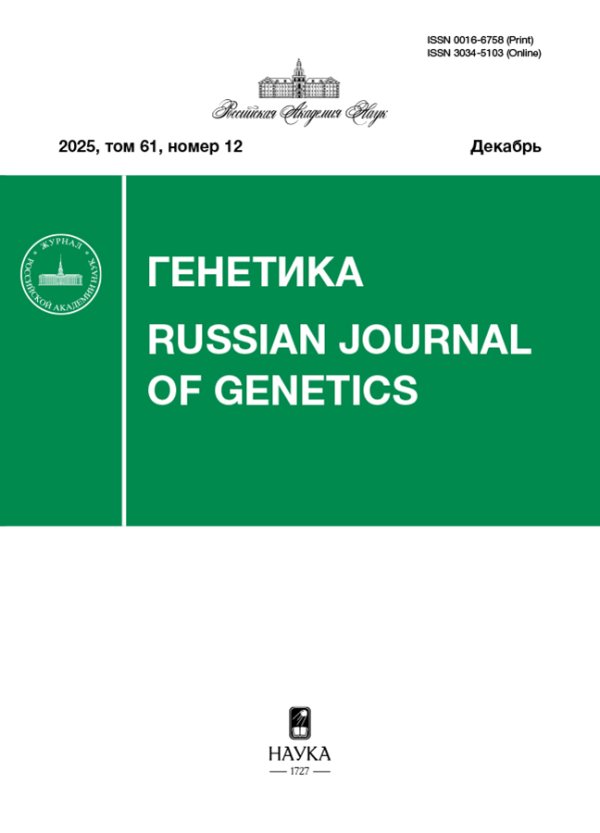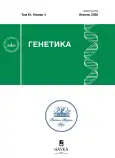The role of polymorphic markers of the FOXP3 gene in the development of essential arterial hypertension
- Authors: Topchieva L.V.1, Kurbatova I.V.1, Korneva V.А.2, Zhulai G.А.1
-
Affiliations:
- Institute of Biology of Karelian Research Centre Russian Academy of Sciences
- Petrozavodsk State University
- Issue: Vol 61, No 4 (2025)
- Pages: 55-65
- Section: ГЕНЕТИКА ЧЕЛОВЕКА
- URL: https://journal-vniispk.ru/0016-6758/article/view/289508
- DOI: https://doi.org/10.31857/S0016675825040065
- EDN: https://elibrary.ru/UAUPST
- ID: 289508
Cite item
Abstract
The association of polymorphic loci –924A>G (rs2232365) and –3279C>A (rs3761548) of the FOXP3 gene with the risk of developing essential arterial hypertension was studied. A total of 151 DNA samples from healthy individuals and 155 DNA samples from patients with EAH (stages I–II) were used. The frequency of occurrence of the –924A>G (rs2232365) polymorphic marker of the FOXP3 gene was almost the same in the groups of conditionally healthy individuals and patients with EAH (χ2 = 0.07 and χ2 = 0.42, p > 0.05, respectively, for alleles and genotypes). The frequency of the CC genotype for the –3279C>A (rs3761548) marker of the FOXP3 gene was higher in the group of patients with hypertension (χ2 = 5.67, p = 0.018). An association was found between the carriage of the CC genotype for rs3761548 and the risk of developing hypertension (OR = 1.967 (95%CI 1.12–3.45)). The level of FOXP3 gene transcripts in peripheral blood leukocytes of healthy people did not depend on the carriage of allelic variants for rs2232365 and rs3761548 (p > 0.05). In carriers of the C allele for the polymorphic marker rs3761548, the content of IL-10 and IL-2 in the blood plasma was lower than in individuals with the AA genotype (p = 0.025, p = 0.017, respectively). The polymorphic marker –3279C>A of the FOXP3 gene is involved in the predisposition of Karelia residents to the development of EAH, probably through the effect on the level of IL-10 and IL-2.
Full Text
About the authors
L. V. Topchieva
Institute of Biology of Karelian Research Centre Russian Academy of Sciences
Author for correspondence.
Email: topchieva67@mail.ru
Russian Federation, Petrozavodsk
I. V. Kurbatova
Institute of Biology of Karelian Research Centre Russian Academy of Sciences
Email: topchieva67@mail.ru
Russian Federation, Petrozavodsk
V. А. Korneva
Petrozavodsk State University
Email: topchieva67@mail.ru
Russian Federation, Petrozavodsk
G. А. Zhulai
Institute of Biology of Karelian Research Centre Russian Academy of Sciences
Email: topchieva67@mail.ru
Russian Federation, Petrozavodsk
References
- Zhang Z., Zhao L., Zhou X. et al. Role of inflammation, immunity, and oxidative stress in hypertension: New insights and potential therapeutic targets // Front. Immunol. 2023. V. 13. https://doi.org/10.3389/fimmu.2022.1098725
- Guzik T.J., Nosalski R., Maffia P., Drummond G. Immune and inflammatory mechanisms in hypertension // Nat. Rev. Card. 2024. V. 21. P. 396–416. https://doi.org/10/1038/s41569-023-00964-1
- Zhang J., Liu S., Ding W. et al. Resolution of inflammation, an active process to restore the immune microenvironment balance: A novel drug target for treating arterial hypertension // Ageing Res. Rev. 2024. V. 99. https://doi.org/10.1016/j.arr.2024.102352
- Dikiy S., Rudensky A.Y. Principles of regulatory T cell function // Immunity. 2023. V. 56. № 2. P. 240–255.
- Ovchinnikov A., Filatova A., Potekhina A. et al. Blood immune cell alterations in patients with hypertensive left ventricular hypertrophy and heart failure with preserved ejection fraction // J. Cardiovasc. Dev. Dis. 2023. V. 10. https://doi.org/10.3390/jcdd10070310
- Wang Z., Wang J., Yang P. et al. Elevated Th17 cell proportion, related cytokines and mRNA expression level in patients with hypertension-mediated organ damage: A case control study // BMC Cardiovascular Disorders. 2022. V. 22. Р. 257. https://doi.org/10.1186/s12872-022-02698-3
- Tang Y., Shen L., Bao J. et al. Deficiency of Tregs in hypertension-associated left ventricular hypertrophy // J. Clin. Hypertens. 2023. V. 25. P. 562–572. https://doi.org/10.1111/jch.14660
- Gackowska L., Michałkiewicz J., Helmin-Basa A. et al. Regulatory T-cell subset distribution in children with primary hypertension is associated with hypertension severity and hypertensive target organ damage // J. Hypertens. 2020. V. 38. № 4. P. 692–700. https://doi.org//10.1097/HJH.0000000000002328
- Sakaguchi S., Mikami N., Wing J.B. et al. Regulatory T cells and human disease // Annu. Rev. Immun. 2020. V. 38. P. 541–566. https://doi.org/10.1146/annurev-immunol-042718-041717
- Golzari-Sorkheh M., Zúñiga-Pflücker J.C. Development and function of FOXP3+ regulators of immune responses // Clin. Exp. Immun. 2023. V. 213. P. 13–22. https://doi.org/10.1093/cei/uxad048
- Mertowska P., Mertowski S., Podgajna M., Grynalska E. The Importance of the transcription factor Foxp3 in the development of primary immunodeficiencies // J. Clin. Med. 2022. V. 11. № 4. https://doi.org/10.3390/jcm11040947
- Ono M. Control of regulatory T-cell differentiation and function by T-cell signalling and Foxp3 transcription factor complexes // Immunology. 2020. V. 160. P. 24–37. https://doi.org/10.1111/imm/13178
- Colamatteo A., Carbone F., Bruzzaniti S. et al. Molecular mechanisms controlling FOXP3 expression in health and autoimmunity: From epigenetic to post-translational regulation // Front. Immunol. 2020. V. 10. https://doi.org/10.3389/fimmu.2019.03136
- Dong Y., Yang C., Pan F. Post-translational regulations of Foxp3 in Treg cells and their therapeutic applications // Front. Immunol. 2021. V. 12. https://doi.org/10.3389/fimmu.2021.626172
- Yilmaz K., Haeberle S., Kim Y.O. et al. Regulatory T-cell deficiency leads to features of autoimmune liver disease overlap syndrome in scurfy mice // Front. Immunol. 2023. V. 14. https://doi.org/10.3389/fimmu.2023.1253649
- Oda J.M., Hirata B.K., Guembarovski R.L., Watanabe M.A. Genetic polymorphism in FOXP3 gene: Imbalance in regulatory T-cell role and development of human diseases // J. Genet. 2013. V. 92. P. 163–171. https://doi.org/10.1007/s12041-013-0213-7
- Shen Z., Chen L., Hao F. et al. Intron-1 rs3761548 is related to the defective transcription of FOXP3 in psoriasis through abrogating E47/c-Myb binding // J. Cell Mol. Med. 2010. V. 14. P. 226–241. https://doi.org/10.1111/j.1582-4934.2008.00370.x
- Кобалова Ж.Д., Конради А.О., Недогода С.В. и др. Артериальная гипертензия у взрослых. Клинические рекомендации 2020 // Рос. кардиол. журн. 2020. Т. 25. № 3. https://doi.org/10.15829/1560-4071-2020-3-3786
- Mostafa M., Fathy A.A., Elwasify M., Abdelsalam M. Analysis of selected polymorphisms in FOXP3 gene in a cohort of Egyptian patients with schizophrenia // J. Genet. Eng. Biotechnol. 2022. V. 20. Р. 83. https://doi.org/10.1186/s43141-022-00371-y
- Inoue C.J., Flauzino T., Gonçalves B.P. FOXP3 variants are independently associated with transforming growth factor B1 plasma levels in female patients with inflammatory bowel disease // Clinics. 2022. V. 11. Р. 58. https://doi.org/10.1016/j.clinsp.2022.100084
- Fan Y., Wu J., Yin S. et al. Associations of FOXP3 gene polymorphisms with susceptibility and severity of preeclampsia: Ameta-analysis // Am. J. Reprod. Immunol. 2022. V. 88. № 1. https://doi.org/10.1111/aji.13554
- Lu M., Nie J., Shen H. et al. The forkhead box protein P3 gene rs3761548 promoter polymorphism confers a genetic contribution to the risk of preeclampsia: A systematic review and meta-analysis // Cytokine. 2023. V. 164. https://doi.org/10.1016/j.cyto.2023.156164
- Liu J., Wang G., Yang J. et al. Association between FOXP3 polymorphisms and expression and neuromyelitis optica spectrum disorder risk in the Nothern Chinese Han population // Translat. Neurosc. 2024. V. 15. https://doi.org/10.1515/tnsci-2022-0337
- Giri P.S., Patel S., Begum R. et al. Association of FOXP3 and GAGE10 promoter polymorphisms and decreased FOXP3 expression in regulatory T cells with susceptibility to generalized vitiligo in Gujarat population // Gene. 2021. V. 768. https://doi.org/10.1016/j.gene.2020.145295
- Lu L., Barbi J., Pan F. The regulation of immune tolerance by FOXP3 // Nat. Rev. Immun. 2017. V. 17. P. 703–717. https://doi.org/10.1038/nri.2017.75
- Saraiva M., Viera P., O’Garra A. Biology and therapeutic potential of interleukin-10 // J. Exp. Med. 2020. V. 217. https://doi.org/10.1084/jem.20190418
- Short W.D., Steen E., Kaul A. et al. IL-10 promotes endothelial progenitor cell infiltration and wound healing via STAT3 // FASEB J. 2022. V. 36. № 7. Р. e22298. https://doi.org/10.1096/fj.201901024RR
- Gao Y., Tu D., Yang R. et al. Through reducing ROS production, IL-10 supresses caspase-1-dependent IL-1β maturation, thereby preventing chronic neuroinflammation and neurodegeneration // Int. J. Mol. Sci. 2020. V. 21. № 2. https://doi.org/10.3390/ijms21020465
- Ezzeddinia R., Somia M.H., Taghikhanib M. et al. Association of FOXP3 rs3761548 polymorphism with cytokines concentration in gastric adenocarcinoma patients // Cytokine. 2021. V. 138. https://doi.org/10.1016/j.cyto.2020.155351
- El-Maddawy E.A., Bakry R.M., Moussa M.M. et al. Genetic variation in FOXP3 and ROR-γ genes in pediatric acute lymphocytic leukemia (ALL) patients: Сorrelation with associated cytokines // Discover Oncology. 2022. V. 13. № 1. Р. 86. https://doi.org/10.1007/s12672-022-00549-3
- Ramirez R.N., Chowdhary K., Leon J. et al. FOXP3 associates with enhancer-provoter loops to regulate Treg-specific gene expression // Sci. Immunol. 2022. V. 7. № 67. https://doi.org/10.1126/sciimmunol.abj9836
- Apert C., Galindo-Albarra´n A.O., Castan S. et al. IL-2 and IL-15 drive intrathymic development of distinct periphery-seeding CD4+Foxp3+ regulatory T lymphocytes // Front. Immunol. 2022. V. 13. https://doi.org/10.3389/fimmu.2022.965303
- Khalifa O., Pers Y., Ferreira R. et al. X-linked miRNAs associated with gender differences in rheumatoid arthritis // Int. J. Mol. Sci. 2016. V. 17. P. 1852–1864. https://doi.org/10.3390/ijms17111852
- Zhang W., Tao Z., Xu F. et al. An overview of miRNAs involved in PASMS phenotypic switching in pulmonary hypertension // Biomed. Res. Int. 2021. https://doi.org/10.1155/2021/5765029
- Yan Y., Xu Y., Ni G. et al. MicroRNA-221 promotes proliferation and migration of pulmonary arterial smooth muscle cells (PASMCs) by targeting tissue inhibitor of metalloproteinases-3 (TIMP3) // Cardiovasc. Diagn. Theоr. 2020. V. 10. № 4. P. 646–657. https://doi.org/10.21037/cdt-20-328
- Wang Y., Gao C., Zhou K. et al. MicroRNA-532-5p-programmed cell death protein 4 (PDCD4) axis regulates angiotensin II-induced human umbilical vein endothelial cell apoptosis and proliferation // Microvasc. Res. 2021. V. 138. https://doi.org/10.1016/j.mvr.2021.104195
Supplementary files













